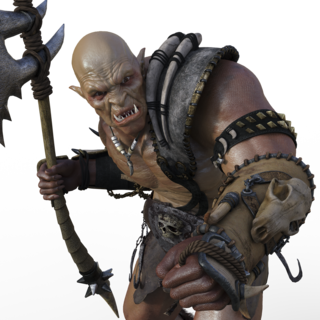Bias
Do Fantasy Role-Playing Games Promote Racism?
Claims that images of “evil” fantasy races abet racism are not evidence-based.
Posted June 25, 2022 Reviewed by Vanessa Lancaster
Key points
- A new study examined if playing Dungeons and Dragons is associated with greater racism.
- Higher trait aggression was associated with more ethnocentric attitudes, while playing D&D was not.
- The study’s results demonstrate a lack of evidence that playing D&D increases racism.

Depictions of fantasy races that don’t exist in the real world—most famously, the orcs in Lord of the Rings—have been criticised in recent years as either based on racist stereotypes or at least promoting such stereotypes in real life. Such claims rest on dubious readings of the source materials and reflect a broader societal tendency to treat everything as “problematic.”
This has become an issue in the famous fantasy role-playing game Dungeons and Dragons (D&D): Controversy has arisen over depictions of monster “races” such as orcs, which are depicted as inherently evil, or at least strongly predisposed to be such.
A recent study (Ferguson, 2022) aimed to shed some actual light on this issue by examining whether playing this game is associated with greater racism and found that it is not. Additionally, most people surveyed, whether D&D players or not, did not find the depiction of orcs in the game either offensive or racist.
Previous research suggests that people’s choices within fantasy games tend to reflect their existing personality traits, so it may be that games like D&D afford people an opportunity to express their inner selves rather than that such games shape people’s real-world attitudes and behaviours.
To examine whether playing D&D is associated with greater racism, Ferguson recruited over 300 people through an online survey.
Respondents were asked about their leisure interests, including a question about hours per week playing D&D; about 17 percent had played at least once during the previous week.
Racism was assessed with an ethnocentrism scale, which measures how much one prefers being around members of one’s own ethnicity and dislikes those of different ethnic backgrounds.
Additionally, they read a description of orcs that are actually used in D&D, which emphasizes orcs’ innate propensity for destruction and slaughter, although noting that an orc, “if raised outside its culture, could develop a limited capacity for empathy, love, and compassion.” (Critics of D&D have argued that this specific description of orcs is “problematic” and encourages the belief that some groups of people in the real world are inherently evil.)
Respondents were asked questions about how they viewed this description, including subtle questions assessing both positive (e.g., “These creatures sound like worthwhile foes for good guys to fight”) and negative views (e.g., “This description offended me”) and blunter questions about whether they considered the description racist.
Respondents also completed a measure of trait aggression, i.e., one's general predisposition to engage in verbal and physical aggression, as a control variable, in case more aggressive people were more attracted to violent media such as D&D.
No Link Found Between Game Play and Racism
In the results, higher trait aggression was associated with more ethnocentric attitudes, whereas playing D&D was not. Additionally, respondents’ overall views of the description of orcs were largely positive, although there were striking differences between responses to the subtle and blunt questions. For example, only 10.2 percent indicated that they found the description “offensive,” whereas 34 percent found it “racist.” However, only 19.6 percent agreed that they “worry that players of D&D experiencing this may become more racist in real life.”
Women were more likely than men to consider the description racist, and, somewhat surprisingly, so were people high in trait aggression. Furthermore, there were no differences between white respondents and people of colour in their belief about whether the description was racist, nor between D&D players and non-players.
The study’s results demonstrate a lack of evidence that playing D&D increases racism. Additionally, most respondents did not consider the depiction of orcs as an evil race to be “problematic.” However, they were likelier to answer that it was “racist” than “offensive.”
Ferguson suggested that racism is so emotionally evocative that the question wording might influence how people respond. Some people may be concerned that they might be considered racist if they disagree that something is “racist,” even if they do not personally find it offensive.
That people higher in trait aggression were more likely to say the description was racist might be because aggressive people are more likely to endorse harsh judgments about whether something is socially unacceptable. Higher trait aggression was associated with higher ethnocentrism in the study, which might indicate that highly aggressive people are self-righteous hypocrites.
Ferguson suggested that this association may reflect moral grandstanding, i.e., using moral talk for self-promotion. Previous research on moral grandstanding has linked it with personality traits associated with aggressiveness including narcissistic antagonism (derogating others to increase one’s status) and low agreeableness (consideration for others) (Grubbs et al., 2019).
I appreciated Ferguson’s study and would like to see more studies on D&D. The study might be criticised because it does not address causality or differences in how people actually play the game. For example, some players might avoid focusing on “problematic” descriptions of “evil” races.
Whether playing games that involve supposedly “problematic” descriptions of “evil” races increase real-world racism could be tested experimentally by randomly assigning people to play a game session in which they either fight against villains who are described as doing heinous things because they are members of an explicitly “evil” race or because they are selfish individuals whose race is irrelevant.
If there were any changes in their level of ethnocentrism compared to before playing, this would indicate that the depiction of an evil race was having a problematic effect; if not, it would show that the depiction is irrelevant to the real world.
Fantasy Role-Playing as Self-Expression
Previous research has shown that people’s choices within fantasy game settings are influenced to an extent by their existing personality traits. Therefore, it might be interesting to determine whether such choices indicate existing ethnocentrism. For example, in one study, people were asked to create a character to play in an online game similar to D&D.
Characters could be good, neutral, or evil in their moral alignment. Although most participants preferred good or neutral characters, people low in agreeableness were likelier to create evil ones (Ewell et al., 2016). Similarly, another study found that the occupations players preferred for their characters to some extent reflected their personality traits (Park & Henley, 2007).
For example, those who preferred playing a monk, paladin, cleric, or druid—all religious/helping occupations—tended to be high in agreeableness; whereas those who preferred playing an assassin or necromancer—occupations focused on death, and those that are considered malicious—tended to be low in agreeableness.
Racist and prejudicial attitudes tend to be associated with low agreeableness (Sibley & Duckitt, 2008). Hence, it might be interesting to examine whether people who prefer to play evil characters and professions are more likely to endorse racist attitudes than those who make more benign in-game choices.
Research that considers individual differences like this might help to disentangle whether gameplay involving “evil” fantasy races has any real-world impact or–more likely–that such concerns are overblown and little more than self-righteous virtue signaling.
References
Ewell, P. J., Guadagno, R. E., Jones, M., & Dunn, R. A. (2016). Good Person or Bad Character? Personality Predictors of Morality and Ethics in Avatar Selection for Video Game Play. Cyberpsychology, Behavior, and Social Networking, 19(7), 435–440. https://doi.org/10.1089/cyber.2015.0207
Ferguson, C. J. (2022). Are orcs racist? Dungeons and Dragons, ethnocentrism, anxiety, and the depiction of “evil” monsters. Current Psychology. https://doi.org/10.1007/s12144-021-02551-4
Grubbs, J. B., Warmke, B., Tosi, J., James, A. S., & Campbell, W. K. (2019). Moral grandstanding in public discourse: Status-seeking motives as a potential explanatory mechanism in predicting conflict. PLOS ONE, 14(10), e0223749. https://doi.org/10.1371/journal.pone.0223749
Park, A. E., & Henley, T. B. (2007). Personality and Fantasy Game Character Preferences. Imagination, Cognition and Personality, 27(1), 37–46. https://doi.org/10.2190/IC.27.1.d
Sibley, C. G., & Duckitt, J. (2008). Personality and Prejudice: A Meta-Analysis and Theoretical Review. Personality and Social Psychology Review, 12(3), 248–279. https://doi.org/10.1177/1088868308319226




